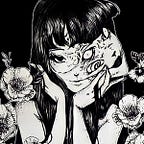by Diadelics (They/Them), March 1st 2022
(Just to note before this, this is a writing style that I am not good at, with a topic I am not good at, with a genre I am not good at. Please, if you are to critique the actual writing of any of my works — make it this one. Love y’all!)
In Osamu Dazai’s semi-autobiography “No Longer Human,” we are taken on a brief journey with social outcast (this phrase being used in the most extreme case), Oba Yozo. From the very start of the book we are exposed to the almost insidious nature of Yozo as we experience his (and in turn, Dazai’s) intrusive thoughts, deceitful interactions, and riveting yet ultimately depressing and strangely relatable struggles taking place in a first-person perspective throughout this short work.
From the very start of his life, Yozo is exposed to terrible things. Being a somewhat neglected child, he sees the true nature of everyone around him (servants, parents, siblings, and even classmates). He feels himself as not-human in the most symbolic way. What it means to be human, for Yozo, is to be a deeply emotional, complicated, yet readable human being — capable of love, care, empathy, and so on — Yozo, seemingly lacking these sensations, is to himself, and even to some readers, barely even human. With his only link to the species being his biology.
Giving off the impression that he is some sort of caring, calm, and even hilarious person in order to hide the deeper alienation he feels from the rest of society, Yozo barely navigates himself through primary and secondary school, finally being able to move out into the city. Despite all that has been said about the man, Yozo actually has some strange heartfelt moments, albeit lacking emotion or any form of empathy at times, Yozo actually does have some interactions with other people that do seem very genuine. One of these interactions, for example, is his rocky relationship with a classmate named Horiki. Horiki, much like Yozo, is a somewhat talented artist (though Yozo doesn’t think so in the slightest) who meets with our narrator in the university that Yozo is going to after his grade school years and they both share common interest in deeper meaning behind the arts, as well as an alienation from the rest of people. Although this, admittedly, taking form in different ways.
This alienation, as it usually does for most young people, eventually leads the two to joining a political extremist group, though not being for the reasons on usually joins. Horiki likes to argue, and Yozo likes examining these people’s supposed “irrationality.” The group in particular is a small Marxist/Communist activist group in Tokyo. Here is when we get to what specifically thinks about Marx.
“Everything he said seemed exceedingly obvious, and undoubtedly true, but I felt sure that something more obscure, more frightening lurked in the hearts of human beings. Greed did not cover it, nor did vanity. Nor was it simply a combination of lust and greed. I wasn’t sure what it was, but I felt that there was something inexplicable at the bottom of human society which was not reducible to economics.”
And this, for those of us who have not read much of Marx, seems to be a fair criticism. A lot of people (even those in the mainstream such as Jordan Peterson) get Marxism wrong by assuming that it focuses too much on reducing human action to a pure economic study. This is incredibly false.
As defined by Oxford, economics as a branch of study is simply “the branch of knowledge concerned with the production, consumption, and transfer of wealth.” And to say that this is what Marxism reduces the study of humans to is just false, as Marx says in the “Grundrisse”
“However, all epochs of production have certain common traits, common characteristics. Production in general is an abstraction, but a rational abstraction in so far as it really brings out and fixes the common element and thus saves us repetition.”
Here, in the very first few pages of the Grundrisse, Marx clearly makes it clear that he sees production as an abstraction, therefore dismissing any claim of production (a core part of the study of economics) as relevant to the study of humans, as for it is only a human abstraction.
Instead, Marx looks at humans as material creatures experiencing the universe learning itself through resolving material contradictions, material contradictions resolving themselves and forming new contradictions.
Marx’s critiques quite simply lay on the foundation that there are good things that should be kept, and things that should be thrown away. He compliments capitalism’s building of industry, but critiques the way in which capitalism fails to stay consistent. His critique of capitalism just simply shows the ways in which the rest of the material world works.
Anyways, if this isn’t as well written or dense, I’m sorry. I have been having burnout with exams coming up and all that stuff. Expect better works in the future.
